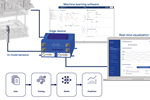Digital mold solution improves energy savings, reduces cycle times
CAMX 2024: SensXPERT showcases the Digital Mold, integrating material characterization sensors directly into plastics and composites manufacturing processes for improved product quality and scrap reduction.
Share
Read Next
SensXPERT, operating within Netzsch Process Intelligence GmbH (Selb, Germany), is showcasing products and technologies for the optimization of plastics and composites manufacturing through enhanced real-time visibility and control. By integrating advanced sensor technologies into production processes, the company aims to enable manufacturers to optimize operations, reduce waste and enhance product quality.
SensXPERT is particularly highlighting the Digital Mold. This solution integrates state-of-the-art material characterization sensors directly into plastics and composites manufacturing processes, providing continuous, real-time data on crucial material behavior during the curing process (read “Next-gen composites manufacturing: Combining material, machine and mold cavity data with analytics”).
The sensors are strategically embedded within molds, ensuring consistent and direct contact with the material throughout production. This setup is designed for precise monitoring of key properties such as degree of cure, crystallization, glass transition temperature and flow behavior. By employing dielectric analysis (DEA), the sensors analyze how molecules within the material respond to an electrical field, offering insights into material behavior.
The real-time data collected also enables manufacturers to make immediate adjustments to processing conditions. This capability is said to be pivotal in detecting and correcting deviations as they occur, optimizing production efficiency and ensuring every part meets stringent quality standards. From adjusting temperature settings to dynamically controlling cycle times, the sensXPERT Digital Mold provides a responsive feedback loop that can minimize waste and maximize yield.
Additional benefits delivered include:
- Up to 50% scrap reduction: By optimizing process parameters in real time, manufacturers can reduce material waste and improve production efficiency.
- Improved product quality: Consistent monitoring and control of material behaviors ensure each part meets or exceeds performance expectations.
- Up to 30% cycle time reduction and 23% in energy savings.
The Digital Mold is designed to seamlessly integrate with existing manufacturing setups, including third-party sensors and machine tool data. This holistic approach to data collection is said to provide comprehensive insights into the entire manufacturing process, which ultimately achieves continuous improvement and strategic decision-making.
Related Content
-
Graphene-enhanced SMC boosts molded component properties
CAMX 2023: Commercially sold GrapheneBlack SMC from NanoXplore increases part strength, stiffness and provides other benefits for transportation, renewable energy, energy storage and industrial markets.
-
CAMX 2023 exhibit preview compilation, Part 1
Prepare for CAMX 2023 in Atlanta with this list of 60+ exhibitor previews received by CW, highlighting key technologies, services and trends available to attendees.
-
VIDEO: High-rate composites production for aerospace
Westlake Epoxy’s process on display at CAMX 2024 reduces cycle time from hours to just 15 minutes.














.jpg;maxWidth=300;quality=90)

